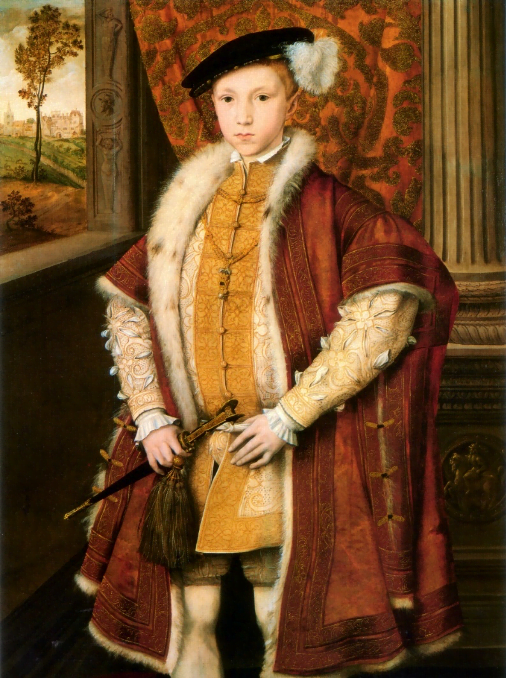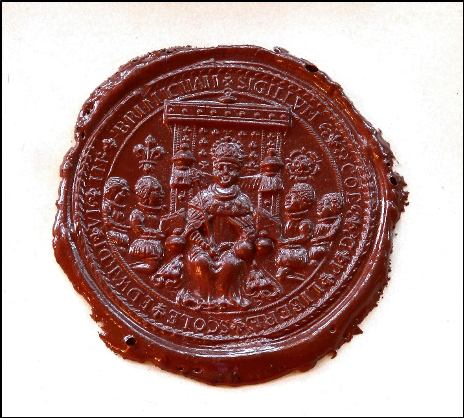
Our history can be traced back as early as 1392 when gifts of land were made to found the Gild of the Holy Cross, which during the next 150 years provided support for the people of Birmingham.
Whilst The Gild of the Holy Cross saw its properties confiscated by the advisers to the new King Edward VI in the wake of the Reformation, leading local parishioners successfully petitioned the King for the return of the Gild’s property assets in order to establish King Edward’s School on 2nd January 1552.
When, in 1547, a Royal Commission dissolved the Gild of the Holy Cross, certain influential men of Birmingham petitioned Edward VI for the return of the gild lands in the form of an endowment for a free Grammar School. On 2nd January 1552 letters patent were sealed, granting this request and appointing twenty of the foremost inhabitants of the town as Governors of a School to be held in the old guildhall in New Street. So, King Edward’s School was created in a small Midlands town, one of thirty such schools founded by Edward VI in his brief reign.

In 1831, the original charter was superseded by an Act of Parliament. This Act empowered the Governors for the first time to create other schools in addition to King Edward’s School itself. Between 1838 and 1853 eight elementary schools were opened. At the same time, the Act broadened the curriculum of the original school by dividing it into separate Classical and English departments, thereby catering for the rising tradesman class. It also authorised the construction of the school’s third and most famous home, Charles Barry’s building in New Street.
In the 1870’s the State started to provide junior education so that the elementary schools had outlasted their usefulness. Now the pressing need was for secondary schools and the structure of the Foundation was changed once more. Grammar schools were created at Aston, Camp Hill (Boys and Girls) Five Ways and Handsworth, whilst King Edward’s School acquired a sister – the High School for Girls, housed in an adjoining building. All but Aston and Handsworth now function from sites to which they were transferred after 1936.
Originally independent, financial considerations persuade the Grammar schools to become voluntary aided in the 1940’s. In 1974 the grammar schools acquired their own governing bodies – appointed by the Foundation, the city, teachers and parents. Until that time twenty-four Foundation governors had been responsible for all seven schools. The formula thus created, of two independent and five grammar schools, the former admitting fee-paying students, the latter offering free education, was a formula for success and under the Direct Grant system which existed from 1944 to 1979, King Edward’s School and the High School for Girls were amongst the most successful schools in the country. These successful schools continue to enjoy excellent reputations both in the city and beyond, educating pupils from a complete cross section of society and have produced men and women of distinction in many fields. In 2011 the five grammar schools converted to academy status so that they are funded directly from central government rather than from the Local Authority.
In September 2010 the Foundation sponsored King Edward VI Sheldon Heath Academy, which opened on the site of its predecessor school and has occupied new buildings on that site since September 2013. The sponsorship of this all-ability school serving its local community in east Birmingham fits well with the Foundation’s charitable purpose of educating children and young persons living in or around Birmingham. It is a good school which is extremely popular and has a thriving sixth form.
A Multi-Academy Trust was created in September 2017 and Handsworth Grammar School for Boys was welcomed into the organisation.
A period of strategic growth has seen two further non-selective schools added to the Academy Trust. King Edward VI Handsworth Wood Girls’ Academy joined in September 2018 and King Edward VI Balaam Wood Academy became the ninth member of the Trust in September 2019.
The Foundation’s eleven schools now educate over 10,000 children in the City and we plan to grow the Academy Trust further by adding another three non-selective secondary academies, with a continuing focus on schools that serve disadvantaged communities in Birmingham.